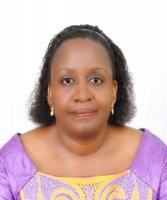
Marina Alois NJELEKELA
YEAR OF MATRICULATION: 1988
EDUCATION:
Marina Alois Njelekela is the University’s ‘Alumna of the Month’ for March2021. She is a Tanzanian physiologist, previously listed as ‘a noteworthy physiologist’ by Marquis Who’s Who, an American world reference resource book that publishes selected short biographies on professionals and personalities from countless global institutions, industries and organisations that are linked with the kind of professional products, services and quality brands they are known to have offered.
Marina was born on July 23, 1964 in Dar-es-salaam, daughter of a Mr Alois Simon and Mrs Bernada Sunzi (Kapinga) Njelekela. She is said to have had a fairly smooth yet hardworking journey through primary, junior secondary and advanced secondary education, with such good ‘A-Level’ school passes in her final secondary examinations as endeared her to the-then only one nationally available University College of Medicine at Muhimbili in 1988. Physiology was her subject of specialisation among other allied disciplines of study. The Doctor of Medicine programme took five years, earning her the MD degree award in 1993. After her graduation in 1993, she went through the necessary stages of professionalization as a trained doctor, spending 1993-1994 in internship at the Tanzanian consultant teaching hospitals, in this particular case at KCMC in Kilimanjaro. In 199495 she served as Registrar at Aga Khan Hospital in Dar es Salaam; and in 1995-96 she was stationed, as a medical officer-in-charge, at Kisarawe District Hospital, away from Dar es Salaam within the Coast Region. In 1996, she became Registrar of the Muhimbili Orthopaedic Institute (MOI) in Dar es Salaam, serving in that position for five years up to 2001. In 2001, she took a tutorial assistantship in physiology at UDSM’s Muhimbili University College. Two years later, in 2003, she became full lecturer in physiology.
From 2003, she took a study leave for undertaking a PhD programme in Human and Environmental Studies at Kyoto University in Japan. For her doctoral programme, Dr. Njelekela’s research study focussed on lifestyle-related diseases in developing countries, realising that diseases such as diabetes and cancer were increasingly becoming a public health concern in developing countries such as Tanzania. In previous years, these diseases had been taken as a problem of Western societies. Upon completion of her PhD programme, Marina returned home to MUHAS to resume work as senior lecturer since September 2009, serving also as the Head of Department of Physiology, well up to October 2011. In the meanwhile, she had been keen on pursuing a master’s degree in public health (MPH) at MUHAS in the light of issues, diseases and approaches to life-style-related habits and disease incidence in the public-health domain. She earned this award in 2012.
For three years (from October 2011 to November 11/2014), Dr. Njelekela had an appointment to serve as Executive Director of the Muhimbili National Hospital (MNH), overseeing all professional and administrative aspects of a modern national hospital, a responsibility she carried out with all care and dedication. She reverted to her teaching job as Senior Lecturer at the University as from December 2014, teaching and researching there up until July 2015 when she voluntarily retired.
In August 2015, Marina was invited by a private firm, Deloitte Consulting Limited, to serve as Chief of Party on a 1½-year USAID ‘‘Tunajali II Programme’ up to January 2017, renewed since for a similar initiative, Boresha Afya Programme, under similar institutional arrangement
USAID Boresha Afya Southern Zone program was initiated on 1 October 2016 in five regions of Morogoro, Iringa, Njombe, Lindi and Mtwara. The program, funded by PEPFAR through USAID Tanzania, is an integrated prevention-care-and-treatment program aimed at enabling the environment for HIV/AIDS service delivery in the Southern Zone. It provides high quality integrated services to people with HIV at 516 health facilities and increases access to health services for people living with HIV (PLHIV) from the communities. Dr. Marina Alois Njelekela is a CIRA International Visiting Fellow working with Dr. Donna Spiegelman (ScD), Susan Dwight Bliss Professor of Biostatistics at Yale School of Public Health. Dr. Njelekela serves/d the Chief of Party of the, managed by Deloitte Consulting Limited as the prime. This is a flagship programme funded by PEPFAR through USAID for four years (to 2021), with Marina as the programme director. Evidently, she has successfully led the programme to considerable success through initiatives in testing, treatment and viral load suppression.
Over the years, Dr. Njelekela has played a number of professional roles. These include membership to a number of professional associations such as the Medical Association Tanzania; the Medical Women Association Tanzania (MEWATA) also as publicity secretary and subsequently as Chairperson for 6 years; and the Japanese Society for Nutrition and Food Science.
She is credited with more than 54 publications and research reports, including ‘Elevated blood pressure among primary school children in Dar es salaam, Tanzania: Prevalence and risk factors’ (with Alfa Muhihi, Rose N.M. Mpembeni & Davis Ngarashi, Dec. 2018); ‘Effect of training community health workers and their interventions on cardiovascular disease risk factors among adults in Morogoro, Tanzania: study protocol for a cluster randomized controlled trial’ (with Alfa Muhihi, David P. Urassa & Rose N.M. Mpembeni, December 2018). She is also recipient of various awards, including the ‘Women In Action International Fellowship (WIAIF)’, ‘Women of Achievements Award’, the Fogarty International Fellowship of the MUCHS-Harvard Programme (2009) and the prestigious ‘Martin Luther King Drum Major Award for Justice’ bestowed on her by the US Embassy in January 2010 for her efforts to improve women’s access to health care services.

